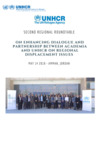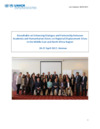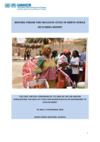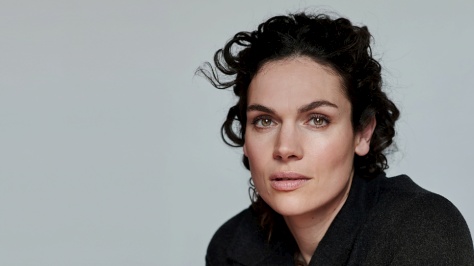UNHCR provides shelter to Iraqis uprooted by conflict in Anbar
Markazi camp is three kilometres from Bzeibiz bridge over the Euphrates river, the main access point from Anbar to Baghdad province.

Children displaced from Central Iraq in Markasi camp, Ameriyat Al Fallujah, Anbar province. © UNHCR/N. Micevic
BAGHDAD, Iraq, Oct 20 (UNHCR) - The UN refugee agency has opened a new camp for internally displaced persons (IDPs) in Ameriyat al-Fallujah, in Iraq's Anbar province.
The new Markazi camp is located some three kilometres from the Bzeibiz bridge over the Euphrates river, the main access point from Anbar to Baghdad province, and can provide shelter for some 3,000 displaced Iraqis.
The majority of the camp's residents have fled fighting in Ramadi since April this year, and have been living in schools, unfinished buildings or staying with relatives around Ameriyat al-Fallujah, which serves as a safe haven for uprooted Iraqis in the restive Anbar province.
More than 250,000 civilians are estimated to have fled Ramadi since April, with the majority staying inside Anbar province itself living with host families, in informal settlements, unfinished buildings, schools or renting apartments.
"Marzaki camp is strategically located close to the bridge connecting Anbar and Baghdad provinces so that residents can have access to safety in case conflict lines move closer to the camp," said UNHCR Iraq Representative Mr Bruno Geddo.
"Displaced people scattered throughout the area in poor living conditions will now be able to properly settle down and benefit from medical and other services close by in Baghdad," he added.
Many of those fleeing Anbar continue to be denied access into Baghdad province due to security-driven restrictions imposed by authorities, requiring Anbar residents to have relatives or some other kind of 'sponsor' in Baghdad.
In recent months, thousands of Iraqis have been stranded for days on the Anbar side of the bridge, often staying in dire conditions without enough food or proper shelter. While the situation at the bridge has improved, an estimated 50 displaced families remain at the Anbar side, unable to cross the river into Baghdad.

Displaced families from Central Iraq receive basic domestic items in Markasi camp, Ameriyat Al Fallujah, Anbar province. © UNHCR/N. Micevic
Among Markazi camp's new residents is Rawa, 23, and her husband and three children.
"We fled Ramadi four months ago. For a while, we sheltered under the trees and we had to change buses six or seven times to reach Alrahalyia," she said.
Alrahalyia is on the way between Ramadi and Ameriyat al-Fallujah.
Lacking a sponsor, Rawa's family has not been granted access to Baghdad though her husband Mohammed who suffers from serious eye problems, is allowed to cross the bridge to seek medical treatment in the city.
Markazi is next to two existing UNHCR camps, already accommodating another 3,000 displaced, bringing camp hosting capacity inside Anbar to 6,000. The newest camp can be expanded to host another 3,000 people, if required. Last month, UNHCR also opened the Sadr Al-Yusufiya camp, sheltering close to 2,000 people on the other side of the bridge, in Baghdad province.
The Markazi camp features 50 communal kitchens, 25 shaded areas, and 50 washing facilities as well an internal electricity network, along with daily water trucking. Some 300 people (or 50 families) moved into the camp on Monday (October 20), with more expected in the coming days.
The new arrivals have received mattresses, a stove, kitchen utensils, a water tank, an air cooler and other household items to help them settle in.
There are currently some 3.2 million internally displaced Iraqis spread across 3,000 different locations across the country. Anbar province hosts the largest number of IDPs - some 580,000 or 18 per cent of the total IDP population.
UNHCR has been able to build Markazi camp thanks to flexible funding from donors. Countries including the US, Sweden, the Netherlands, Norway, Denmark, Australia, France, Spain, Switzerland, and Canada have been providing UNHCR with unrestricted funding to address the urgent needs of internally displaced Iraqis and allow a timely humanitarian response.
Related news and stories
100,000 new Somali refugees arrive in Ethiopia in the past month, UN and partners are calling for urgent funding
Twelve years on, Syrian refugees face deepening debt and hunger
UNHCR teams and partners rush assistance to some 100,000 newly arrived Somali refugees in hard-to-reach area of Ethiopia
House repairs restore hope for Ukrainian family after year of turmoil
As security worsens in DR Congo, UNHCR and partners seek US$605 million to assist Congolese refugees across Africa
Tens of thousands arrive in Ethiopia, fleeing recent clashes in Somalia
-

Regional Roundtable on the Role of Faith-Based Organizations in Addressing Displacement in MENA
7 Dec 2021 The purpose of the meeting was to explore the role of religion in promoting universal understanding and respect of human dignity, and faith-based responsibility towards displaced people and refugees. The main goal of the roundtable was to formulate commitments or pledges from religious actors in the region to refugees at a time of heightened tensions in some places towards the GRF. -

Second Regional Roundtable On Enhancing Dialogue and Partnership Between Academia and UNHCR on Regional Displacement Issues
7 Dec 2021 The second regional academia roundtable, co-hosted by UNHCR, the WANA Institute and the Columbia Global Center | Amman saw the participation of over 40 participants from various think tanks, academic institutions and research centers from across the MENA region. This gathering provided a platform for academia to frame its role in influencing policy, programs and discourse related to displacement in the MENA region in the context of major global processes including the Global Compact on Refugees (GCR) and the Comprehensive Refugee Response Framework (CRRF). -

Roundtable on Enhancing Dialogue and Partnership between Academia and Humanitarian Actors on Regional Displacement Crises in the Middle East and North Africa Region
7 Dec 2021 Organized by the UNHCR MENA Policy Unit, in partnership with the West Asia-North Africa (WANA) Institute, the first of its kind regional roundtable for academia brought together academics, think tanks, research centers, and university professors from 12 countries to discuss their role in humanitarian interventions. The discussions brought to light challenges that academia faces, and generated concrete suggestions and good practices in relation to solutions. -

The First MENA Roundtable on the Role of Art and Culture in Addressing Displacement
7 Dec 2021 The roundtable was the first of its kind in the region and aimed to discuss how artists and cultural actors can shape public narratives and expand the space for constructive dialogues, particularly in relation to social cohesion between refugees and host communities. The roundtable provided a platform for over 50 artists and cultural actors to frame their role in issues related to displacement in MENA and share successful practices of promoting refugee inclusion. -

Mayors Forum for Inclusive Cities in North Africa Outcomes Report
7 Dec 2021 The Mayor's Forum for Inclusive Cities in North Africa brought together mayors, municipality authorities and civil society organisation representatives from major refugee hosting cities in Egypt, Morocco, Algeria, Libya, Tunisia and Mauritania. The forum was hosted by UNHCR under the supervision of the Mayor of Tunis and aimed to build a common platform of good practices and learning among cities and with UNHCR, on the challenges and opportunities facing sustainable policy design and operational for inclusive cities. -
Briefing to the United Nations Security Council
7 Dec 2021 -

Evaluation of UNHCR's engagement in humanitarian-development cooperation Sep 2021
7 Dec 2021 This report contains the findings of an evaluation of UNHCR's engagement in humanitarian-development cooperation (Sep 2018 - March 2021). The evaluation was commissioned by UNHCR due to recent high-level policy developments and initiatives, such as the 2016 Global Compact on Refugees, in order to support a more comprehensive response to displacement, involving both humanitarian and development actors. Attachments: Executive Summary, Management Response and Annexes (.zip) -

Age Gender and Diversity Tip sheet - Helping to ensure AGD inclusive pledges and good practices for the GRF (ENG, 2021)
6 Dec 2021 This Tip Sheet builds on the progress made at the 2019 Global Refugee Forum (GRF) to help ensure pledges address gaps related to age, gender, and diversity (AGD), including disability, in refugee responses. -

Anna Drijver
Anna Drijver has been supporting UNHCR since 2018.
